Has anxiety over the events of 2020 been getting the better of you lately? You’re certainly not alone but there are things you can do to manage your anxiety and reduce your stress levels. GP Juliet McGrattan has some advice.
A recent nationwide survey of 2000 participants commissioned by YourZooki and conducted by OnePoll showed that 70 per cent of the UK population are anxious at the thought of being in busy places, and 29 per cent are having more unhealthy snacks and drinks than before the pandemic started. One in four are drinking more alcohol. Couple that with concerns over finances, work and family and it’s no wonder that more and more of us are experiencing moments or months of anxiousness.
Anxiety can be low and grumbling, creating a daily feeling of nervous unease and tension. It may also happen in sudden, intense episodes, often in response to a particular situation or thought. Anxiety sufferers may experience panic attacks, where a feeling of dread and fear results in over-breathing (hyperventilation), faintness, nausea and fast palpitations.
Anxiety affects both body and mind. Alongside the unpleasant symptoms of the anxiety come wider health consequences. In an effort to avoid anxiety triggers, the easiest solution is to avoid going out. This can lead to loneliness, isolation and depression. Self-esteem and self-confidence suffer, and life can become very limited.
Exercise and anxiety
Focusing on what we can control rather than what we can’t can help us when we feel anxious. We can control the amount of exercise we do, and exercise is very useful for both treating and preventing anxiety. Physical activity triggers the release of chemicals from the brain which both lift mood and lower tension. Endorphins bring a sense of happiness and wellbeing whilst endocannabinoids have a calming effect. Intense and prolonged exercise such as running, or boxing will give you the biggest release of these natural, feel-good chemicals but when suffering from anxiety you may prefer calmer forms of exercise. Yoga, for example, offers a meditative element and can be done from home which is a great benefit if going outside makes you feel anxious. Exercise can help build the self-esteem and confidence that may have been lost during lockdown. Setting yourself a goal or target can help you feel more positive about the future.
Natural treatments
The risks and benefits of using popular herbal supplements such as valerian, kava and passionflower extract to treat anxiety are not fully understood and more research is needed. Be aware that supplements may interact with medications or existing medical conditions so check with your pharmacist before you use them.
Caffeine, alcohol, high sugar foods and smoking can all increase symptoms of anxiety so reducing or stopping these is recommended. An increase in the amount of time we spend looking at our screens is linked to anxiety, so scheduling tech-free time can help. Try to maximise your sleep; sleep deprivation makes everything worse. Simple steps such as a good sleep routine, winding down before bed and making sure your bedroom is cool and calm can improve sleep.
Next time you feel anxiety setting in, don’t try to convince yourself it’s not happening, or it shouldn’t happen. Allow the feelings to wash over you. You can try to repeat affirmations that may make you feel better or remind yourself of other occasions when you managed to get through feeling like this. Repeat positive statements until you start to feel the anxiety subsiding. Take care of yourself afterwards, too. Have a drink of water, rest for a while or talk to someone.
Remember that negative thoughts are just thoughts and not necessarily based on reality or what might happen. Next time a negative thought creeps in, write it down, read it back to yourself and question whether or not it’s really true. Writing these thoughts down will enable you to think about them in a more rational way and you may then find you have an entirely different perspective.







